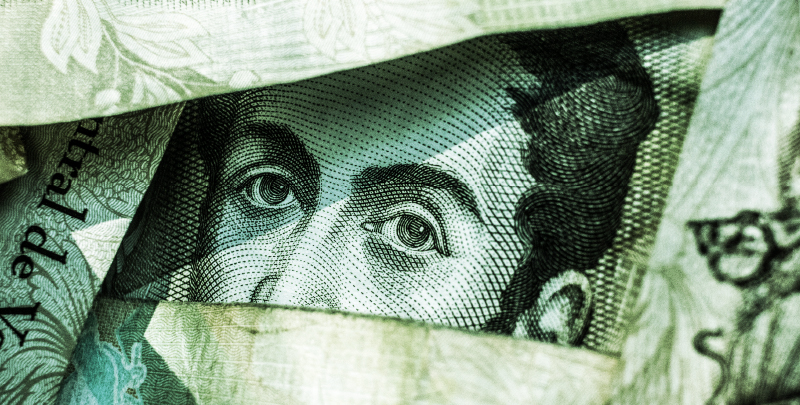Making Money in the Shadows
When making a profit, and then a bigger profit, becomes a person’s primary objective, can financial corruption be far off?
For well over a century, Harley Street, a grand and tranquil pocket of central London, has been synonymous with the medical profession. Like Wall Street for finance or Fleet Street for journalism, Harley Street became known as the home of Great Britain’s leading doctors and surgeons. Its expensive, gentrified terraced buildings speak of the highest standards of medical discretion and professionalism.
Its reputation remains strong today, which makes the stone-fronted five-story house at number 29, only five minutes’ walk from the Royal Society of Medicine, such an anomaly.
Number 29 Harley Street was once, like its neighbors, the site of medical practice, but it is now home to a different sort of business: the registered address for 2,159 companies, and the birthplace of many thousands more. Almost none of them perform their commercial operation there, however, which raises an obvious question: Why?
Formations House, which operates from this address, is in the business of company formation. It offers to set up companies for its customers, navigating the often tricky UK and EU legal requirements. Its website claims to have performed this service more than four hundred thousand times since 2004. There’s nothing unique or illegal about its industry; but it is an example of a critical part of modern international trade—a trade that is sometimes less than respectable.
What lies beneath this building’s genteel exterior is the anodyne tip of an international culture of illicit trade and underhanded dealing that is as disturbing as it is prevalent. We all live in a world of corruption, which sounds like unsupportable and irresponsible hyperbole—until one realizes its extent.
The Profit Motive
Making profit has been integral to human life for millennia. Control and codification of trade has been in existence nearly as long. The earliest known market restraint came in the form of the Babylonian Code of Hammurabi, which enshrined protections (sometimes on penalty of death) on property and its sale. The battle between profit and restraint has persisted ever since and became especially prevalent in recent centuries, bolstered by the wide adoption of Enlightenment ideas of personal liberty and the free market.
One of the most effective ways of making profit is by securing advantages over the competition, something we’ve become more and more adept at. Whether making multimillion-dollar deals on the stock market, negotiating a favorable mortgage, or finding cheaper ways to buy food, we are each involved in this system. And it’s undeniable that competitive advantage can sometimes be found most effectively by sidestepping or even breaking the rules—as long as you don’t get caught.
Norman Stanley Fletcher, a cynical criminal in the 1970s British sitcom Porridge, encapsulated a mindset that is all too familiar in our modern world. Referring to himself and his fellow prisoners, he quipped, “We’re all here for the same reason—we got caught.” Cutting through the moral quagmire of motivation and circumstance, Fletcher portrayed criminal activity as part of a life where getting caught is the simple penalty for not playing the game better. This approach is as applicable now as it was then.
In recent centuries, the typical means of breaking the rules—for example, smuggling, fake IDs, moles and informers, cash-in-hand bribes—served as familiar plot staples for novels and films everywhere. Such shady enterprises maintained a relatively slow and steady evolution. That is, until recently. A whole host of factors—including the collapse of communism, the spread of Western-style capitalism across a globalized market, and the rise of the Internet, social media and digital currencies—have produced a plethora of new opportunities for those who wish to make money creatively. It’s a largely clandestine market, untethered from the international state-based legal system, and yet it touches nearly all of our lives in various ways.
“Old forms of illicit trade persist, but the newest forms of illicit trade, tied to computers and social media, operate as if on steroids.”
It’s an underworld of which most are only vaguely aware. Historian and journalist Misha Glenny calls it “the Global Shadow Economy.” It covers a wide spectrum of activity, from what might be called “naughty” (offshore bank accounts, selling medicine without a prescription) to criminal (tax fraud, drug smuggling) to what most would term morally reprehensible (human trafficking, child pornography).
People make money at every level of this economy, all across the world, from London to the Ukraine to Colombia to Zimbabwe to China to Delaware. In the United States, cigarettes are bought in North Carolina (where state taxes on cigarettes are low), smuggled to Michigan (where taxes are high), and sold for a profit. Rhinoceros horn is illegally poached in Southern Africa and smuggled to East Asia, where it is prized as medicine. Women and children are trafficked from former Soviet republics for a host of unsavory purposes. Illegally acquired fortunes are hidden in private bank accounts in Nevis and Luxembourg. And in London, company formation allows an illegitimate business to buy the veneer of respectability (and an additional level of obfuscation with which to confuse authorities) by registering the company at a respectable address, such as 29 Harley Street, even if none of their activities actually occur there.
Let Freedom Reign
In a sense, none of this is new. People have been ingenious about moneymaking for a long time. As George Mason University professor Louise I. Shelley notes, a growing shadow economy “merely accentuated trade trends that had been evident for centuries.” But there’s a significant difference today, resulting in a market that has, in Shelley’s words, “expanded exponentially.”
Some of its roots lie in the 20th century’s global battle of attrition, the Cold War. Following World War II, money was hard to come by and difficult to move. Taxes in most Western countries were high, and international trade was highly regulated. It was “a global financial architecture,” widely known as the Bretton Woods monetary system after the town that hosted the conference where it was created in 1944. According to journalist Oliver Bullough, that system was “intended to give primacy to democracy for perpetuity,” but it collapsed within a few years of its inception. There are numerous reasons for this, as expertly spelled out in Bullough’s Moneyland, but ultimately it was broken by the desire of bankers, initially in the United Kingdom, to sidestep currency restrictions. This willingness to break rules for individual gain is a persistently repeating hallmark of the shadow economy.
The collapse of Bretton Woods left a vacuum in which free-market principles came to the fore: freedom of movement, freedom of investment, freedom of choice. As Bullough explains, nowadays “money flows ceaselessly between countries, nosing out investment opportunities in China, or Brazil, or Russia, or wherever.” This structural breakdown provided opportunities for numerous creative endeavors, from oil price manipulations in the 1970s to the boom or bust of 1980s Wall Street to the rise in the international drug trade. But it wasn’t until the combination of seismic events at the close of the 1980s that the global shadow economy as we now know it, with its multitude of corrupt practices, came into being.
At the heart of this shadow economy are the ideas of freedom and movement. Every person, every good, every bit of money is constantly casting around for a loophole and a way of making profit. Bullough writes that the system “keeps mutating, it keeps expanding, and the wealthy keep finding new tunnels down into it.” The hallmark of modern urban life that Henry James so presciently identified in The American Scene in 1907—“the universal will to move—to move, move, move, as an end in itself, an appetite at any price”—has spread well beyond city boundaries to become a symbol of the world economy in general.
The target for much of this illegal activity, if it can be said to have one, is government. As Glenny states, “smuggling goods with high rates of tax is the oldest form of organized crime,” and this crime is committed at the expense of government bank accounts. It is sometimes difficult to identify a victim in this system. The absence of an identifiable victim, and the enormous concomitant potential profit, make the shadow economy even more appealing.
“The arcane nature of fraud and its status as a ‘victimless’ crime (nobody suffers direct personal injury by the theft of taxpayers’ money) boosts its popularity, along with the extraordinary sums it can earn.”
The liberalization of the international market allows a wily operator to find cheap raw materials in one place (for example, Africa), move them to another place where manufacturing and labor are inexpensive (China), then sell them to another place where prices are high (Europe and North America). This is the legitimate free market at work. A corrupt version of this underpays for the raw materials, sidesteps customs at every port, flushes turnover through a bewildering series of shell companies located all over the world, pays creditors in difficult-to-trace digital currencies such as Bitcoin, registers the business in a country where taxes are low or nonexistent, and then stashes the profits in a bank that guarantees privacy, even in the face of international investigation. It is in this alternative way that the biggest profits are to be found—as long as you don’t get caught.

What to Do?
International law is struggling to keep up with the shadow economy’s ingenuity. Identifying a crime is only the first step in investigation; tracing the line of evidence from country to country (and navigating their respective legal infrastructures) through a maze of shell companies and alternative aliases is a wearying, and rarely successful, endeavor. “The deeper the involvement of shadow funds with the licit money markets,” Glenny writes, “the harder it becomes to follow the cash that is the key to the successful policing of international organized crime.”
Bullough tells the story of the tiny Caribbean island of Nevis, which became independent in 1983. The nation has no significant natural resources, and a population of only 11,000 at the time of the 2011 census. Nevertheless, it quickly found a way to make its mark on the world economic map. Beginning by helping American ships to avoid US shipping regulations by allowing them, for a fee, to sail restriction-free under the Nevis flag, the fledgling country then turned to banking and finance. Drawing on existing American legislation, especially from Delaware and Wyoming, it created a sophisticated barrier of privacy around its accounts. Nevis does not recognize foreign court orders, so any prosecution of its account holders must happen via its own system; but beginning the process requires an intimidating £100,000 fee, with no promise or even great likelihood of success. Its banks guarantee complete privacy to its account holders and do not even require the identity of the account’s owner. Company registration there is tax-free, which explains why there are considerably more companies “based” there (18,000) than there are people.
Nevis is not alone in these creative endeavors. Other countries, such as Cyprus and Malta, offer citizenship at a price (thereby allowing people an escape route from unwelcome investigations in their native countries), while others offer nominal government positions to people who want to hide their activities under the cover of diplomatic immunity. It’s an extraordinary and unabashed abuse of a fundamental principle of the international order. As solicitor and former president of the Commonwealth Lawyers Association Mark Stephens asks, “is the international community really prepared to accept the prospect of wealthy fraudsters and crooks . . . skirting around legitimate justice systems simply because they hold a diplomatic passport from an impoverished nation?”
It’s a fair question but, as Bullough notes, it is “much harder to think of anything that can be done about it.” The scale and prevalence of the global shadow economy are truly overwhelming. It is so widespread, in fact, that it’s tempting to wonder whether the term shadow is really apt. Perhaps we are all living in this shade, in a murky world where everyone is constantly looking around for potentially profitable loopholes.
This picture is perhaps overly nihilist, but its elements are undoubtedly recognizable. Shelley, an expert on the link between terrorism, organized crime and corruption, explains that illicit trade “is a consequence of many of the most serious and intractable problems in the world.” That intractability is the most worrying aspect, as the system functions according to many of the basic principles of Western modernity. The economic and personal freedom sought by so many over recent centuries has removed restrictions and inhibitions, allowing the global shadow economy to flourish.
“This shadow world is by no means distinct from its partner in the light, which is itself often far less transparent than one might suspect or desire.”
As Glenny argues, “the criminal operates much closer to home than we think,” making it difficult at times to tell the difference between the legal and the illegal. This is the secret of successful corruption; it inspires trust by appearing honest, while clandestinely abusing that trust for gain. It is reminiscent of the criticism Jesus Christ leveled at Jewish religious leaders of the day who abused their power: He called them “whitewashed tombs” and “hypocrites.” Even more prescient is the warning given in the apostle John’s book of Revelation about a future economic system identified as religio-political “Babylon,” which is predicated largely on trade. That system resonates all too closely with today’s international economy and will be brought down. It tells of “merchants of the earth” who buy and sell precious goods (such as gold and silver) and everyday objects (such as spices, flour and olive oil), but also “slaves and human lives.” This last is most chilling. Most today rightly celebrate the dismantling of the Atlantic slave trade while neglecting to recognize that the sale and ownership of human beings, both literally and figuratively, remains a visible part of our own modern world.
Bullough says that “globalisation is here to stay,” while adding that “we don’t need to accept its dark side: the profusion of anonymous money, which is nosing into our politics, our economies and our major institutions.” Shelley writes in a similar vein, saying, “We do not want a future where there is no trade of any form.”
This is a difficult position to maintain, as both acknowledge. Both licit and illicit economies are immersed in principles of personal liberty, and it’s tricky to make the case against one and not the other. Where, after all, is the moral line when a company registers its international business in a country with low taxes (as Amazon, for instance, did in Luxembourg)? Is this tax evasion or just smart business? Where does freedom end and criminality begin? The general legal principle is that personal liberty must be unrestrained unless it brings harm to others; but in the shadow economy, there seem to be few direct victims (beside governments, which people find difficult to empathize with). And yet there is no doubt that people are suffering.
It seems clear the shadow economy will not be stemmed without significant and widespread action. Shelley writes that “steps must be taken at the global, national, and even community level.” What that action might be, however, is difficult to identify, and even harder to implement. Glenny, writing shortly after the 2008 financial crisis, urged Western governments to tackle money laundering in a serious way, but despite the chaos caused by the credit crunch, there is no sign of this happening. The situation has since worsened with the rise of digital currencies and anonymized social media networks: as these are not governed by the international legal system, they are nearly impossible to track. The growth of the global shadow economy seems inexorable.
Shelley proposes two interesting historic examples of former economies that were nevertheless stopped. The English port of Bristol made its name through the trade of slaves from the 11th to the 19th centuries, while Singapore used to thrive on the illegal smuggling of goods and people. The contrast today could hardly be greater. Neither city is now known for illegal trade, and Singapore in particular is celebrated for its low levels of corruption. These transformations certainly were informed by changes in government and economic policies, but Shelley argues that they also were based on “a change in the mentality of the citizens.”
It is this sort of change in mentality that seems necessary to counter the perniciousness of the global shadow economy. The book of Revelation foretells that the market system it calls Babylon will collapse abruptly and make way for an entirely different system based on honesty, justice and equity; but the usual human response to destruction is to rebuild on principles that have been used before. Overturning international corruption requires a complete transformation in mentality—what ancient Hebrew wisdom speaks of as a change from “a heart of stone” to “a heart of flesh.”
The examples of Singapore and Bristol are useful models, but it’s fair to wonder whether it is possible to replicate this internationally to a system that does not respect national borders and governments. Nevertheless, that is what is required. The shadow economy is based on self-interest and empowered by the pursuit of personal freedom; a healthier system would be a reversal of that. In that world, personal profit would defer to personal growth; and getting caught would be a shame rather than a temporary setback. Freedom would be used for the benefit of others rather than the self.
This is something to aim for. A healthier system needs to be rooted in healthier principles.


